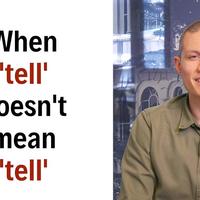When 'tell' doesn't mean 'tell' - English In A Minute - YouTube
Wenn 'erzählen' nicht 'erzählen' bedeutet - English In A Minute - YouTube
Cuando 'tell' no significa 'tell' - English In A Minute - YouTube
Quand "tell" ne veut pas dire "tell" - English In A Minute - YouTube
Quando 'tell' non significa 'raccontare' - Inglese in un minuto - YouTube
tell」が「伝える」を意味しないとき - English In A Minute - YouTube
'tell'가 '말하다'를 의미하지 않을 때 - English In A Minute - YouTube
Kiedy 'tell' nie oznacza 'tell' - English In A Minute - YouTube
Quando "tell" não significa "dizer" - Inglês Num Minuto - YouTube
Когда "tell" не означает "tell" - English In A Minute - YouTube
'Söylemek' 'anlatmak' anlamına gelmediğinde - English In A Minute - YouTube
Коли "сказати" не означає "розповісти" - English In A Minute - YouTube
当 "告诉 "不等于 "告诉 "时 - English In A Minute - YouTube
Hi, everyone!
Think of 'tell' and you think of speaking,
Le mot "raconter" évoque l'expression orale,
but 'tell' doesn't always mean 'tell'.
mais "dire" ne signifie pas toujours "dire".
Let me tell you why…
OK that time I meant speaking.
D'accord, cette fois-ci, je parlais en connaissance de cause.
Not only does the verb 'tell' mean
Le verbe "dire" signifie non seulement
'say something to someone',
it also has a meaning similar to
'know', 'recognise', 'understand', or 'perceive'.
We often use it in combination with the verb 'can'
to make 'can tell' for the present
faire "can tell" pour le présent
and 'could tell' for the past.
et "pourrait le dire" pour le passé.
I can tell he's from France. He has an accent!
Je peux dire qu'il vient de France. Il a un accent !
Eu posso dizer que ele é da França. Ele tem sotaque!
Or:
We could tell it was going to rain because of the clouds.
يمكننا أن نقول أنها ستمطر بسبب السحب.
We often use it to talk about differences.
Nous l'utilisons souvent pour parler des différences.
Then, we might use the negative or the question.
Can you tell the difference between
Pouvez-vous faire la différence entre
this cup and that cup?
I can't tell the difference between this cup and that cup.
Je ne peux pas faire la différence entre cette tasse et celle-là.
We often use 'can tell' with the pronoun 'you'
我们经常将 "可以告诉 "与代词 "你 "搭配使用
to talk about something that many people should
来谈谈许多人应该
find obvious.
发现明显。
You can tell he's an English teacher
On voit qu'il est professeur d'anglais
一看就知道他是英语老师
– he knows all the answers.
- il connaît toutes les réponses.

